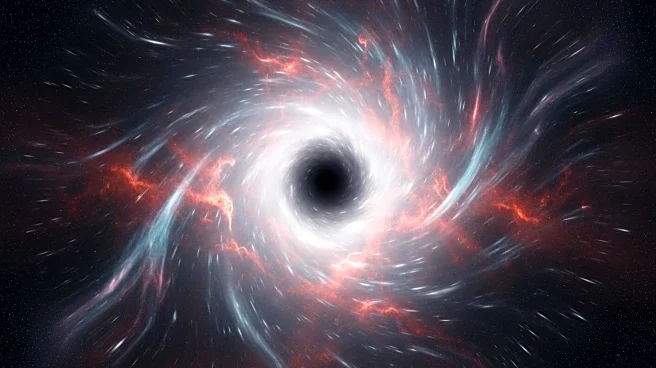What is the story about?
What's Happening?
Physicists have issued a warning about a primordial black hole that could explode within the next decade, potentially leading to a cosmic event of unprecedented scale. This black hole, believed to have formed shortly after the Big Bang, has a 90% chance of exploding by 2035, according to scientists at the University of Massachusetts Amherst. Primordial black holes differ from typical black holes, which form from the collapse of dying stars. Instead, they are thought to have originated from the conditions present in the early universe. Stephen Hawking's studies in the 1970s suggested that these black holes could emit radiation, known as Hawking radiation, and eventually explode. The explosion of a primordial black hole could release a variety of fundamental particles, some of which have not yet been observed, offering insights into the universe's oldest secrets.
Why It's Important?
The potential explosion of a primordial black hole could revolutionize the field of physics by providing evidence for Hawking radiation and revealing fundamental particles that are currently theoretical. Such an event would offer a unique opportunity to observe phenomena that have been largely speculative until now. The implications for our understanding of the universe are profound, as it could confirm the existence of primordial black holes and provide new insights into the conditions of the early universe. This discovery could lead to a significant shift in scientific theories and models, impacting research in cosmology and particle physics.
What's Next?
Scientists are preparing to observe the potential explosion using advanced telescopes, although the event will not be visible to the naked eye. The research team emphasizes the importance of being ready to capture and analyze the data from such an explosion, which could occur every decade or less. The findings could lead to new discoveries about the fundamental particles present in nature and the mechanisms of black hole radiation. Researchers are urging the scientific community to ensure that they are equipped to make the most of this opportunity, which could transform our understanding of the universe.
Beyond the Headlines
The ethical and philosophical implications of observing a primordial black hole explosion are significant. It challenges our understanding of the universe's origins and the nature of existence itself. The event could also spark discussions about the role of human observation in cosmic phenomena and the potential for new technologies to unlock secrets of the universe. Additionally, the discovery could influence cultural perceptions of space and time, as it provides tangible evidence of events that occurred billions of years ago.















